Filter by
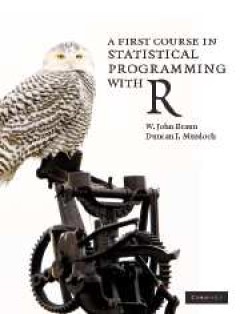
A First Course in Statistical Programming with R
This is the only introduction you'll need to start programming in R, the open-source language that is free to download, and lets you adapt the source code for your own requirements. Co-written by one of the R Core Development Team, and by an established R author, this book comes with real R code that complies with the standards of the language. Unlike other introductory books on the ground-brea…
- Edition
- -
- ISBN/ISSN
- 9780511803642
- Collation
- -
- Series Title
- -
- Call Number
- -
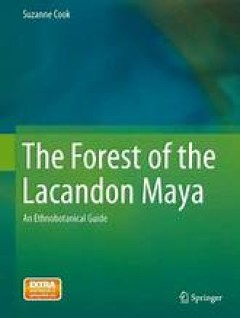
The Forest of the Lacandon Maya
The Forest of the Lacandon Maya: An Ethnobotanical Guide, with active links to audio-video recordings, serves as a comprehensive guide to the botanical heritage of the northern Lacandones. Numbering fewer than 300 men, women, and children, this community is the most culturally conservative of the Mayan groups. Protected by their hostile environment, over many centuries they maintain autonomy fr…
- Edition
- 1
- ISBN/ISSN
- 978-1-4614-9111-8
- Collation
- XXVII, 379, 38 b/w illustrations, 561 illustrations in colour
- Series Title
- -
- Call Number
- -
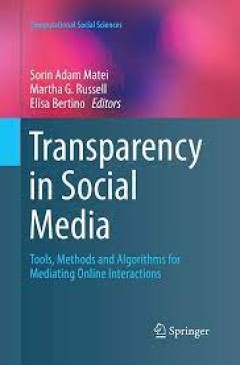
Transparency in Social Media Tools, Methods and Algorithms for Mediating Onl…
The volume presents, in a synergistic manner, significant theoretical and practical contributions in the area of social media reputation and authorship measurement, visualization, and modeling. The book justifies and proposes contributions to a future agenda for understanding the requirements for making social media authorship more transparent. Building on work presented in a previous volume of…
- Edition
- -
- ISBN/ISSN
- 978-3-319-18552-1
- Collation
- -
- Series Title
- -
- Call Number
- -

Translational Research in Pain and Itch
This book provides a comprehensive review of the latest advances in translational pain and itch research, and presents the cutting-edge developments in the study of our two principal, yet most mysteries sensations. Despite the slow progress in the discovery of effective therapies for chronic pain and pruritus, scientists around the globe now have a better understanding of why and how these cond…
- Edition
- -
- ISBN/ISSN
- 978-94-017-7537-3
- Collation
- -
- Series Title
- -
- Call Number
- -
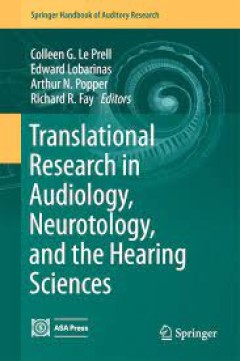
Translational Research in Audiology, Neurotology, and the Hearing Sciences
Translational Research is the interface between basic science and human clinical application, including the entire process from animal studies to human clinical trials (phases I, II, and III). Translational Research moves promising basic science results from the laboratory to bedside application. Yet, this transition is often the least-defined, least-understood part of the research process. Mos…
- Edition
- -
- ISBN/ISSN
- 978-3-319-40848-4
- Collation
- -
- Series Title
- -
- Call Number
- -
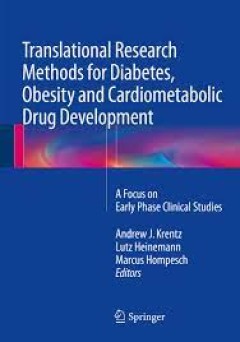
Translational Research Methods for Diabetes, Obesity and Cardiometabolic Drug…
The world is beset by a pandemic of obesity and type 2 diabetes and the need for new drugs is startlingly clear; recent years have seen a huge increase in research activity to fill this gap. The development of new drugs for diabetes and obesity must be founded upon a sound appreciation of the pathophysiology of these common disorders. The dual defects of insulin resistance and impaired insulin …
- Edition
- -
- ISBN/ISSN
- 978-1-4471-4920-0
- Collation
- -
- Series Title
- -
- Call Number
- -
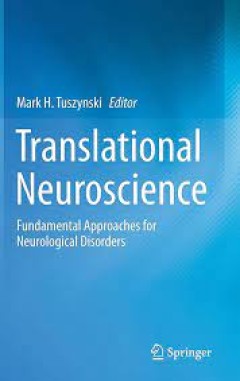
Translational Neuroscience Fundamental Approaches for Neurological Disorders
Translational Neuroscience offers a far-reaching and insightful series of perspectives on the effort to bring potentially revolutionary new classes of therapies to the clinic, thereby transforming the treatment of human nervous system disorders. Great advances in the fields of basic neuroscience, molecular biology, genomics, gene therapy, cell therapy, stem cell biology, information technology,…
- Edition
- -
- ISBN/ISSN
- 978-1-4899-7654-3
- Collation
- -
- Series Title
- -
- Call Number
- -
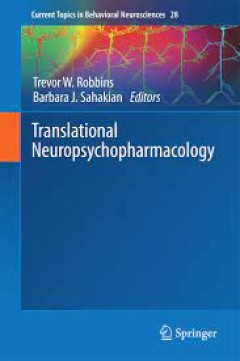
Translational Neuropsychopharmacology
This book covers wide areas of animal and human psychopharmacology with clinical utility in the treatment of psychiatric and neurological (e.g Alzheimer's disease) disorders. The main theme is to develop a new paradigm for drug discovery that questions the claim that animal models or assays fail adequately to predict Phase 3 clinical trials. A new paradigm is advocated that stresses the importa…
- Edition
- -
- ISBN/ISSN
- 978-3-319-33913-9
- Collation
- -
- Series Title
- -
- Call Number
- -
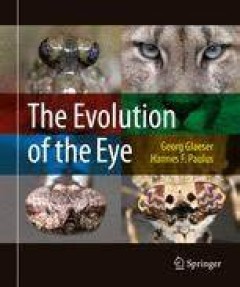
The Evolution of the Eye
With fascinating, spectacularly beautiful images, the book piques readers’ curiosity about the diversity of visual organs. This book is the result of a dual approach – scientific as well as aesthetic. The compelling images are accompanied by an easy-to-read, understandable text, aimed at both scientists and the educated public, and generally anyone interested in the beauty of nature. Thanks…
- Edition
- 1
- ISBN/ISSN
- 978-3-319-17476-1
- Collation
- XVI, 214, 297 illustrations in colour
- Series Title
- -
- Call Number
- -
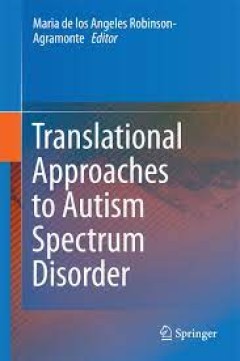
Translational Approaches to Autism Spectrum Disorder
This book addresses and synthesizes recent basic, translational, and clinical research with the goal of understanding the mechanisms behind autism spectrum disorder (ASD) and how they lead to altered brain function and behavior. Bringing clarity to these mechanisms will lead to more effective therapies for the various heterogeneous pathologies that comprise ASD. Currently there are few, if any,…
- Edition
- -
- ISBN/ISSN
- 978-3-319-16321-5
- Collation
- -
- Series Title
- -
- Call Number
- -
 Computer Science, Information & General Works
Computer Science, Information & General Works  Philosophy & Psychology
Philosophy & Psychology  Religion
Religion  Social Sciences
Social Sciences  Language
Language  Pure Science
Pure Science  Applied Sciences
Applied Sciences  Art & Recreation
Art & Recreation  Literature
Literature  History & Geography
History & Geography